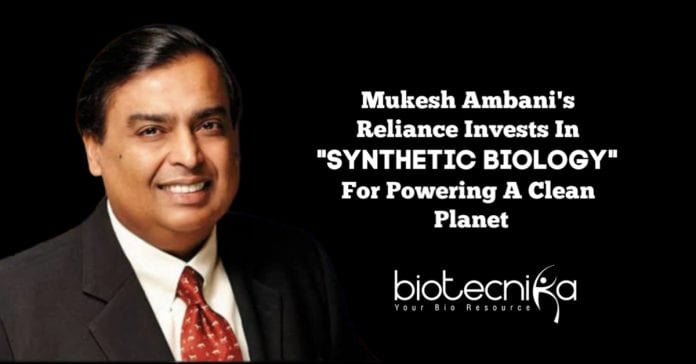Reliance Invest In Synthetic Biology To Power A Clean Planet
Mukesh Ambani, the chairman and managing director of India’s largest conglomerate Reliance Industries Limited, as well as the richest man in Asia, believes that the key to powering a clean planet lies with synthetic biology.
The largest private business in India, Reliance, has been focusing on synthetic biology recently. Its insights from the fields of petrochemical, big energy, textile, and environmental businesses are being applied to fulfill its ambitious and simple goal of powering a clean planet with synthetic biology.
Imagine a future where electronic gadgets repair themselves like living organisms, synthetic jellyfish inside waterbodies destroy toxins, viruses programmed to kill cancer cells, eco-friendly plastics, and fuels produced from yeast and where the whole world’s data is stored in a teaspoon of DNA. Such a future is possible with the help of synthetic biology.
Reliance is embracing this growing new bioeconomy and there is no good reason to not believe that the company’s fortune will rise further.
Technology hand in hand with Biology
Mukesh Ambani believes that technology is the biggest driver of human development, and if you
can use technology to benefit people, then that’s the best business you can have.Reliance’s big entrance into India’s telecom market had made headlines recently, but in retail, Reliance failed to earn success. Reliance’s recent deals in the retail field suggest that Ambani is turning the petroleum giant to a consumer conglomerate of energy, electronics, fashion, and food.
Reliance’s synthetic biology program consists of more than 150 scientists and researchers, and they have recently developed a technology that turns the carbon dioxide waste from the refinery to bio-crude oil by combining the waste with algae and sunlight. This bio-crude oil could one-day fuel carbon-neutral air travel.
When Dhirubhai Ambani, father of Ambani brothers, expired, Mukesh Ambani left Stanford MBA’s program to take up the responsibility of Reliance. Mukesh Ambani, who is a chemical engineer by training acquired technologies and systems that provided Reliance with a world-class economy and a dynamic supply chain.
Reliance is now planning to introduce a bio-innovation scene in India to challenge Asia’s other key players like Shenzhen Synthetic Biology Association, Shenzhen Synthetic Biology Association, and the Hong Kong University of Science & Technology.
Algae to fight climate change
Reliance has long recognized the algae as a clean and sustainable bio-manufacturing platform and invested in synthetic biology. Algae could be used to manufacture anything from food and medicines to fuels and bioplastics in the future. They are good at making fatty acids and fuels.
By tuning its metabolism to produce high-performing oils, algae could be used to manufacture eco-friendly pigments, food and supplies for astronauts, materials for skis and performance wear, or omega fatty acid nutritional supplements by not decimating fishes.
The best thing about algae is that they can survive in sunlight. Traditional electricity-based energy sources are not required for them to grow. Reliance is also trying to enhance the production capacity of algae through genetic engineering.
Currently, Reliance is leading several algae-based projects, including the “waste to health” project intended to turn organic waste into aviation fuel and kerosene. This project to make bio-crude and other chemicals using algae can contribute to reducing greenhouse gas emissions during the traditional way of fuel production.
Most petrochemistry can be replaced by biomanufacturing. That would be a great initiative towards preventing climate change.
Ajit Sapre, head of Reliance’s research and development, said that this is just one among the many kinds of innovation, and this is a kind that makes some impact on society.
At SynBioBeta 2019, Santanu Dasgupta, who leads biology R&D at Reliance, said that the new synthetic biology driven bioeconomy would support a clean environment as well as would uplift India’s economy. He believes that India’s rural communities can be uplifted along with its biotech sector.
The US needs to learn from Ambani
Ambani is indeed a role model for his courage and vision. He acted immediately when he realized the need for oil refining capacity in India and made Reliance invest in synthetic biology. His world’s largest refinery in Jamnagar will be ready to operate in 36 months. Today, Reliance is a global conglomerate that encompasses electronics, fashion, energy, and food—industries that all stand to be disrupted by synthetic biology. He created thousands of high-paying jobs, transformed the Indian economy, and set the path for greener energy.
There is none better than Ambani for the US to follow what policies can push the American industry to new environmental and economic heights in this age of biology.
The Managing Partner at Bioinnovation Legal and an expert on Asia’s biotechnology scene, James Schroeder, said that the US administration has to make a choice in this new era of biorefineries and biomanufacturing.
Instead, if US companies are caught up with leadership indifference and regulatory hostility, most of the jobs in the global bioeconomy will go to companies like Reliance and more thoughtful countries. For the US to be ready for global competition, leadership, and initiative at the highest levels of government are necessary.
But anything could be possible in the new bioeconomy if the US makes synthetic biology a national priority.






























